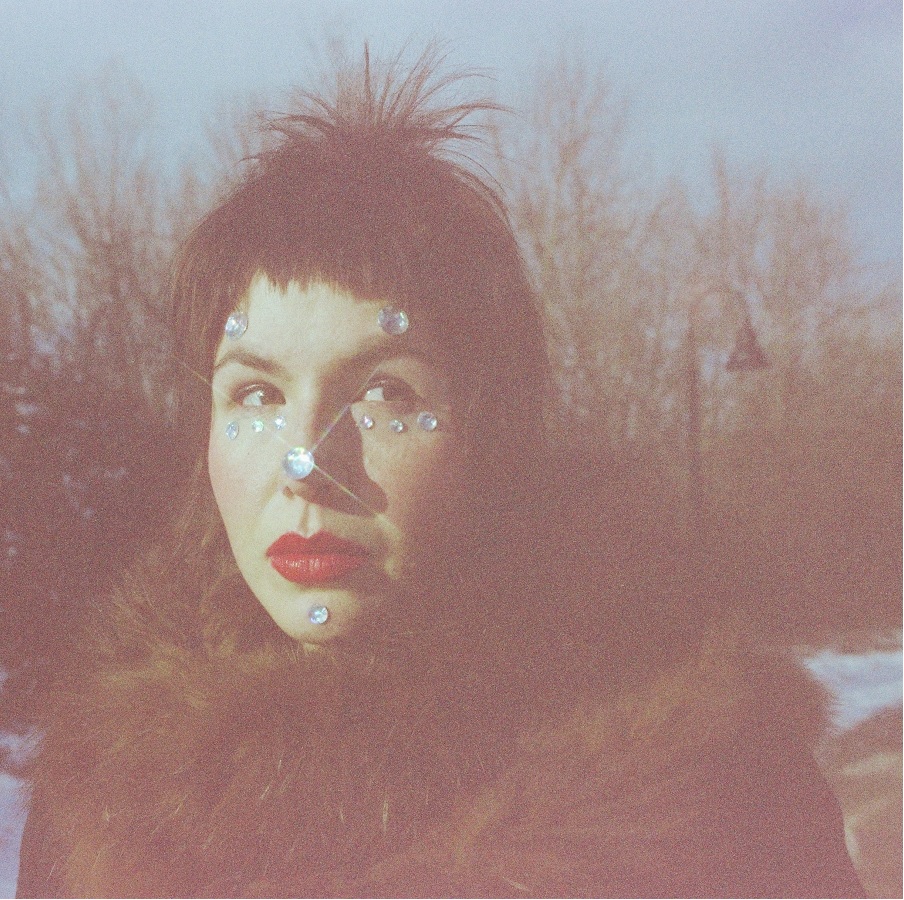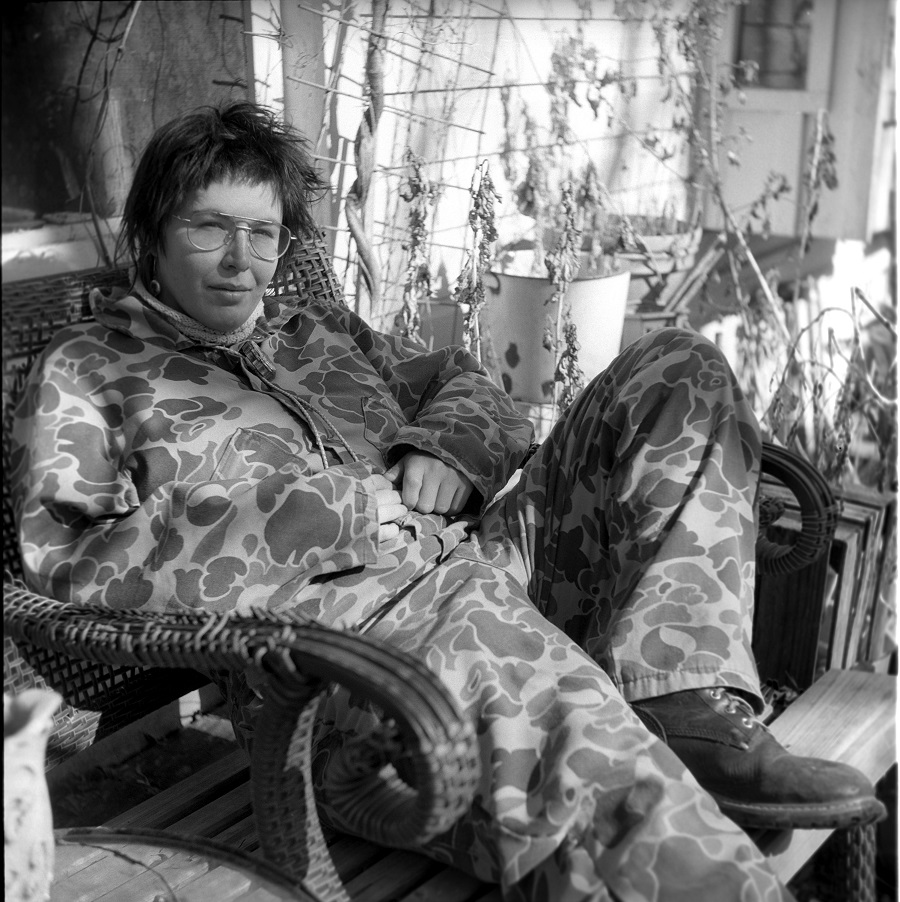Jude Brothers is an Arkansas-forged and New Mexico-molded folksy-leaning singer songwriter with a penchant for whimsy and tender heartedness. Brothers’ distinct writing style is marked by congenial contrasts: passionate & playful, calculated & relaxed, approachable & quirky. Their new song, “torch bare/the boss” picks up the pieces of a failed relationship — and finds the joy in reinvention. Jude is literally Adobe & Teardrops family — their sibling Eryn is an accomplished singer-songwriter on their own. And I recently interviewed the video’s co-star, Creekbed Carter Hogan, on my sister project Rainbow Rodeo, the queer country music zine.

Brothers’ lyrics communicate a simultaneous existential dread and intoxicating thrill of living and loving, a practice in raw and shameless vulnerability shared through song. All of this is transmitted through nimble vocal frolicking- a shapeshifter voice crawling, leaping, pirouetting over a landscape of various string instruments. In their interview, Brothers dives deeper into the song’s origins and complex layers of meaning.
Describe your song “torch bare/the boss.”
This song is called “torch bare/the boss!”, and it’s mostly about the projection of my repressed masculinity onto my former man- “Do I want you, or do I want to Be You? Do I believe fully in your vision, or am I just too scared to execute my own?” I eventually found a new home for my masculine obsession in the wake of separation — in Bruce Springsteen.
The split left me without a place to live, so I did what I guess you do in your 20’s and moved back in with my folks in my shitty (and also amazing) hometown, deep in my alcoholism. I was working 3 jobs at two restaurants and as one of “Santa’s helpers” at the Northwest Arkansas mall. Yes, that was as depressing as it sounds. When I’d drive back to my dad’s house after post-shift closing out the bar, I’d turn on the radio and press the seek button until something came on that made me feel alive. Which, at that time, wasn’t much. But often, I’d manage to find something by the Boss. He made me feel strong, sexy, and proud to be working class.
I started shaking my ass and throwing my shoulders like Bruce in the mirror, holding my jaw like his, taking on his swagger. It inspired me to carry my own torch, back myself, and be the cocky boy that I’d been unwilling to let out all these years, even in the midst of a period of profound sadness. My ex really loved the Springsteen album Nebraska, and I still can’t get all the way through that album without choking up too hard. Something seemed poetic about all that, so what else was I gonna do but write a song about it?
How was it to make the music video?
When making the video, the first and only thing I knew I wanted was to be dressed up as Bruce. Everything else kind of developed in talking out the narrative with my amazing director and friend of 10+ years, Adeliza Backus-Pace, without whom none of this would be possible.
Something like… “Jude-steen” hitchhikes to their shitty gig, and is caught off guard completely by falling into an epic Bromance with another Steen — played by another friend and one of my favorite musicians, Creekbed Carter Hogan out of Austin.
I had no idea who I would cast for this, until I saw his Springsteen Halloween costume on Instagram, and knew instantly that he was the other Steen…”Creek-steen”!
He’s the best co-star I could have ever asked for, inspiring me always to wonder “Okay but how do we make this even sillier and sweeter?” It amplified the healing power of the video for me, turning such a sad song into such a light-hearted and joyful thing.
It also feels important to mention that we were shooting this video while the Arkansas Senate was trying to pass one of their recent pieces of genocidal legislation, attempting to criminalize trans and gender non conforming folks’ existence. It was eventually gutted here, but we are by no means out of the woods with this bullshit, in Arkansas or anywhere else.
It was a strangely perfect time to be riding around in the bed of a pickup truck through rural northwest Arkansas, euphoric in my makeupped-on five-o-clock shadow. Aware suddenly of how I’ve taken my fluidity for granted, the ability and right to express and play with gender however I feel that particular day. I wondered about this as a product of the privilege I carry, and my relative ease hiding in plain sight in the day to day. I wondered about how I was gonna protect my friends. I wondered what it would be like to be perceived as a man. I wondered if I’d ever figure any of this out. I wondered if I’d have to leave Arkansas again. I wondered if other kids growing up in Arkansas would be safe to figure any of this out.

Explain the title of your album.
It’s called render tender/blunder sunder, which for me is a fun little phrase I made up for myself to make light of an intensely humbling process of transformation and becoming. Sometimes you diligently take things apart, and expose the most vulnerable pieces in an intentional, delicate sort of way. And sometimes you fuck everything up so bad that everything gets uprooted entirely! I’ve been oscillating between these points for some years now. So it felt like the perfect title for an album it’s taken me about 5ish/6ish years to bring out into the light.
Does your album have an overarching theme?
Oh definitely. It could fit quite nicely into the classic heartbreak/comeback category of albums. Of course, it feels like more than that to me! Though it’s very personal, I really hope it is relatable/helpful to others who might need it.
There was a very long, intense and enmeshed relationship in my life, both a creative and romantic one. I lost myself in it entirely, and in fact, used it to hide from myself. It ended with an agonizing severance, and what felt like complete erasure. I’ve spent the years following this epic disintegration trying to parse out what is mine/not mine, working to recover the pieces of self I’ve abandoned along the way, and letting go of the ones that have been begging to die for a long time. This album is a very raw and honest exploration of all of that. It’s kind of like an oversimplified map of my healing journey.
Who are some of your musical influences?
So much and so many have influenced my musicality- and I’ve already been ramblin wild enough with these questions, but there’s so many musicians that shape not just my sound, but the way I think and feel about music. In no particular order: Karen Dalton, Lucinda Williams, Buffy Saint-Marie, Joanna Newsom, Gillian Welch, Kate Bush, Alice Coltrane, X-Ray Spex, Arthur Russell, Molly Drake, Anne Briggs, Sandy Denny, Miriam Makeba, Tori Amos, Lucero, Mamady Keita, Patsy Cline, Nina Simone, John Prine, Yolanda Del Rio, Fugazi, Aldous Harding, Y La Bamba, Johnny Flynn, Diane Cluck. …That’s the short list.
I’m also strongly under the influence of books! This album in particular, was made while I was rereading over and over, three pieces of writing that have shaped me on a soul level: All About Love by bell hooks, When Women Were Birds by Terry Tempest Williams, and A Field Guide To Getting Lost by Rebecca Solnit.
Perhaps the strongest influences on me are oak and juniper trees, limestone, rivers, songbirds and wildflowers. I spend as much time with them as possible.
How do you feel your coming out journey plays into your music?
I was still all kinds of closeted when I first started writing songs in private as a teenager, and both my coming out in terms of identity and musicality feel linked in that way. My songs and my dreams were the places where I really began to sit with both my gender and sexuality, allowing myself to be curious about who I was outside of what was put upon me. Music has never let me hide from myself, always digging out something that wants to be looked at! Openly recognizing my bisexuality/pansexuality & gender fluidity wouldn’t have been possible without my songwriting work, and my songwriting work is certainly made possible by recognizing and embracing those parts of myself.
How do you feel your queer identity ties into your performance style or music?
Maybe this is a cliche answer or something, or maybe I only think it’s a cliche because many folks I know feel this way- queerness is an aspect of my ever transforming and shifting identity- one of the only constants I’ve been able to track within that identity. So, it touches everything. Relationships to people, to nature, to dreams, to desires, to perceptions, and of course to music.
As for my small body of released musical work, I find that it’s filled with a queerness born of a curiosity for and commitment to mystery… So much about embracing queerness is about engaging with mystery for me. I hope to use my queerness and music in tandem, to forsake a formulaic pattern of existence and carve a new path. Wish me luck.
Jude Brothers — Official, Bandcamp, Instagram, Spotify, Apple Music

Love your work!!! Beautiful! Look forward to hearing more, thank you..